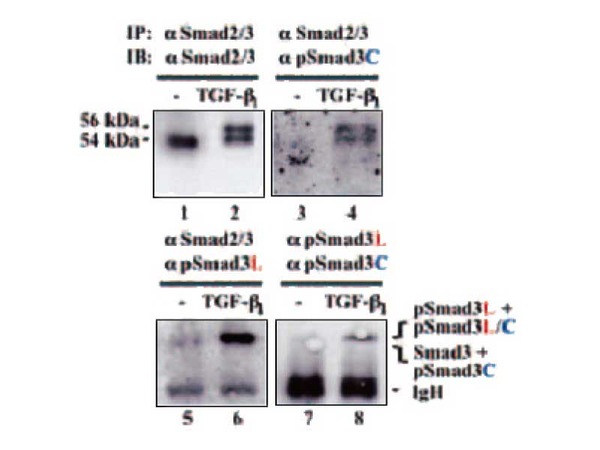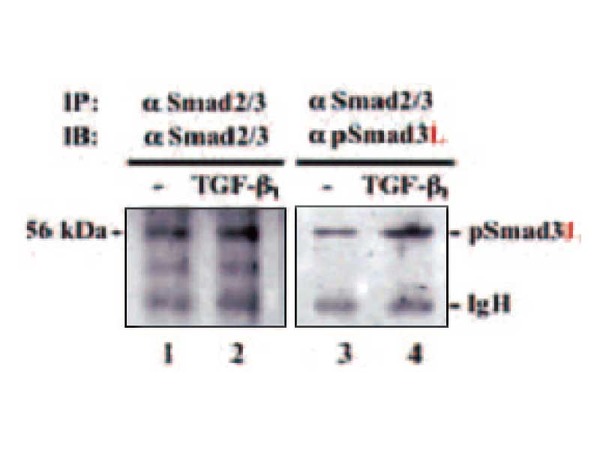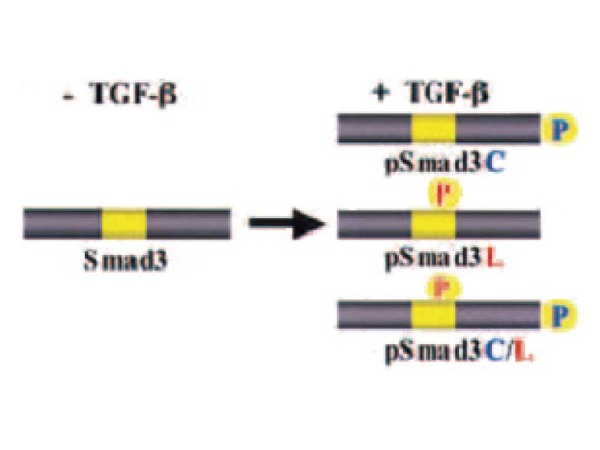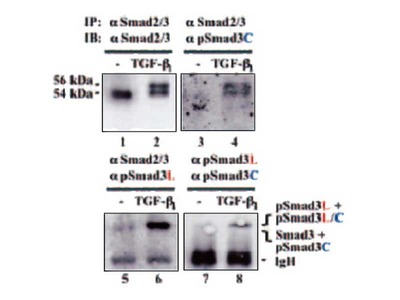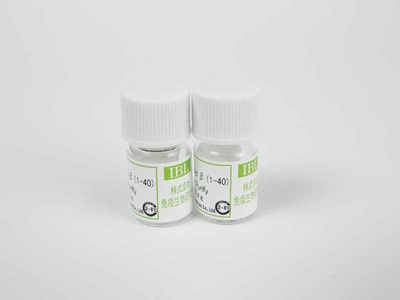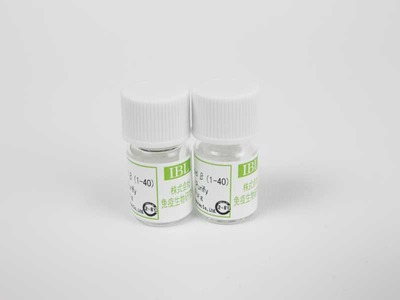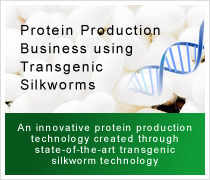- HOME >
- For Researchers >
- Product Search >
- Search Result >
- #28031 Anti- Smad3C (Ser 423/425 Phosphorylated) Rabbit IgG Affinity Purify
Product Search
#28031 Anti- Smad3C (Ser 423/425 Phosphorylated) Rabbit IgG Affinity Purify
- Intended Use:
- Research reagents
- Application:
- WB, IP, IHC
- Package Size1:
- 50 μg
- Package Size2:
- 5 μg
- Note on Application Abbreviations
- WB:Western Blotting
- IP:Immunoprecipitation
- IHC:Immunohistochemistry
※ The product indicated as "Research reagents" in the column Intended Use cannot be used
for diagnostic nor any medical purpose.
※ The datasheet listed on this page is sample only. Please refer to the datasheet
enclosed in the product purchased before use.
Product Overview
Product Overview
| Product Code | 28031 |
|---|---|
| Product Name | Anti- Smad3C (Ser 423/425 Phosphorylated) Rabbit IgG Affinity Purify |
| Intended Use | Research reagents |
| Application | WB, IP, IHC |
| Immunizing antigen | Synthetic peptide of phosphorylated Smad3C (Ser 423/425) |
| Purification Method | Purified with antigen peptide |
| Specificity | Reacts with phosphorylated Smad3C (Ser 423/425) of human, rat and mouse. |
| Package Form | Lyophilized product from PBS containing 1 % BSA and 0.05 % NaN3 |
| Storage Condition | 2 - 8℃ |
| Poisonous and Deleterious Substances | Applicable |
| Cartagena | Not Applicable |
| Package Size 1 | 50 μg |
| Package Size 2 | 5 μg |
| Remarks1 | The commercial use of products without our permission is prohibited. Please make sure to contact us and obtain permission. |
Product Description
Product Description
Smads are critical mediators conveying signals from the TGF-β-superfamily members to the nucleus. Activated TGF-β type I receptor (TβRI) and c-Jun N-terminal kinase (JNK) differentially phosphorylate Smad3 to convert two distinctive phosphoisoforms: C-terminally phosphorylated Smad3 (pSmad3C) and linker-phosphorylated Smad3 (pSmad3L). Reversible shifting of Smad-dependent signaling between tumor suppression and oncogenesis in hyperactive Ras-expressing cells indicates that pSmad3C transmits a tumor-suppressive TGF-β signal in mature epithelial cells, while oncogenic activities such as cell proliferation and invasion are promoted by the pSmad3L pathway. Notably, pSmad3L-mediated signaling in activated mesenchymal cells promotes fibrosis by stimulating extracellular matrix deposition. As neoplasia progresses from normal epithelial cells through adenoma to cancer, the cells undergo transition from the tumor-suppressive pSmad3C pathway, which is characteristic of mature epithelial cells, to the JNK/pSmad3L pathway, which appears to favor the state of flux shown by the activated mesenchymal cells. Analysis of domain-specific phosphorylation states of Smad3 with the Abs should enhance understanding of TGF-β signaling in cancer and fibrosis, and help many researchers seek for new treatments of such diseases.
References
References
- p130Cas induces bone invasion by oral squamous cell carcinoma by regulating tumor epithelial-mesenchymal transition and cell proliferation. Yaginuma T et al. Carcinogenesis. 2020 Aug 12;41(8):1038-1048.PMID: 31996896
- Immune cell expression of TGFβ1 in cancer with lymphoid stroma: dendritic cell and regulatory T cell contact. Ohtani H et al. Virchows Arch. 2018 Jun;472(6):1021-1028.PMID: 29594353
- Aberrant Smad3 phosphoisoforms in cyst-lining epithelial cells in the cpk mouse, a model of autosomal recessive polycystic kidney disease. Hama T et al. Am J Physiol Renal Physiol. 2017 Dec 1;313(6):F1223-F1231.PMID: 28877884
Note: Retrieve by PMID number in displayed by abstract: http://www.ncbi.nlm.nih.gov

